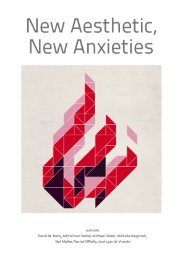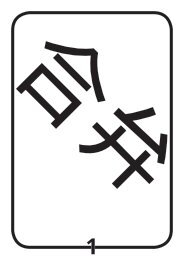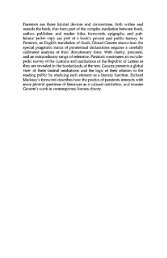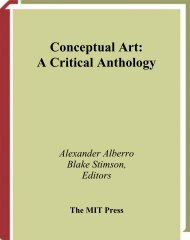You also want an ePaper? Increase the reach of your titles
YUMPU automatically turns print PDFs into web optimized ePapers that Google loves.
disappointment of expectations of meaning (the famous surrealist 'jolt'), by<br />
entrusting the hand with the task of writing as quickly as possible what the head<br />
itself is unaware of (automatic writing), by accepting the principle and the<br />
experience of several people writing together. Leaving aside literature itself<br />
(such distinctions really becoming invalid), linguistics has recently provided the<br />
destruction of the Author with a valuable analytical tool by showing that the<br />
whole of the enunciation is an empty process, functioning perfectly without<br />
there being any need for it to be filled with the person of the interlocutors,<br />
Linguistically, the author is never more than the instance writing, just as I is<br />
nothing other than the instance saying I: language knows a 'subject', not a<br />
'person', and this subject. empty outside of the very enunciation which defines<br />
it, suffices to make language 'hold together', suffices, that is to say, to exhaust it.<br />
The removal of the Author (one could talk here with Brecht of a veritable<br />
'distancing', the Author diminishing like a figurine at the far end of the literary<br />
stage) is not merely an historical fact or an act of writing; it utterly transforms<br />
the modern text (or - which is the same thing - the text is henceforth made and<br />
read in such a way that at all its levels the author is absent), The temporality is<br />
different. The Author, when believed in, is always conceived of as the past of his<br />
own book: book and author stand automatically on a single line divided into a<br />
befo re and an after, The Author is thought to nourish the book, which is to say<br />
that he exists before it, thinks, suffers, lives for it, is in the same relation of<br />
antecedence to his work as a father to his child, ln complete contrast, the modem<br />
scriptor is born simultaneously with the text, is in no way equipped with a being<br />
preceding or exceeding the writing, is not the subject with the book as<br />
predicate; there is no other time than that of the enunciation and every text is<br />
eternally written here and now, The fact is (or, it follows) that writing can no<br />
longer designate an operation of recording, notation, representation, 'depiction'<br />
(as the Classics would say); rather, it designates exactly what linguists, referring<br />
to Oxford philosophy, call a performative, a rare verbal form (exclusively given<br />
in the first person and in the present tense) in which the enunciation has no<br />
other content (contains no other proposition) than the act by which it is uttered<br />
- something like the I dec/are of kings or the I sing of very ancient poets, Having<br />
buried the Author, the modern scriptor can thus no longer believe, as according<br />
to the pathetic view of his predecessors, that this hand is too slow for his<br />
thought or passion and that consequently, making a law of necessity, he must<br />
emphasize this delay and indefinitely 'polish' his form, For him, on the contrary,<br />
the hand, cut off from any voice, borne by a pure gesture of inscription (and not of<br />
expression), traces a field without origin - or which, at least, has no other origin<br />
than language itself, language which ceaselessly calls into question all origins,<br />
We know now that a text is not a line of words releasing a single 'theological'<br />
Barthes/ jThe Death of the Author/ /43








